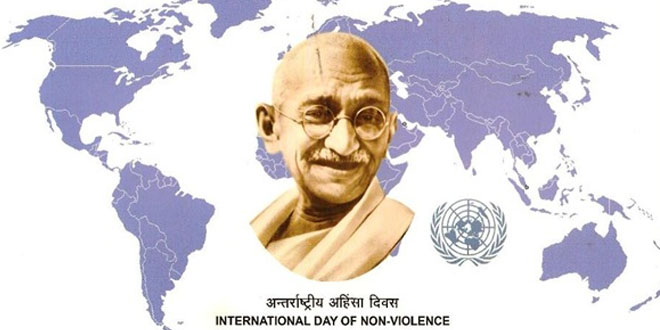
Why Pakistan needs to celebrate the International Day of Non-Violence
The United Nations’ (UN) International Day of Non-Violence is a worldwide observance that creates awareness and endorses non-violence with the help of education towards this stance and promotes it among the public. It is annually held on October 2nd in recognition of the renowned peace leader Mahatma Gandhi’s birthday.
All through his life, Gandhi was a man of commitment to his faith in non-violence no matter how oppressive or aggravating the circumstances may be. He had a certain theory behind his actions, which comprised of the encouragement of massive civil disobedience to British law as with the historic Salt March of 1930, which was that, “just means leads to just ends”. This motive is leading to the understanding of how irrational it is a cause to take up violence as a solution to ordain peace in society. He was a hard-core believer that violence or hatred is a symbol of cowardice and it that it leads to nothing but failure.
The day became a global observance by the UN to promote non-violence ideologies and policies to accomplish tolerance and empathy. This day provides us with a platform to evaluate our current efforts that we step up towards being peaceful in the world, whether or not they are appropriate and come through to work.
The norm of non-violence — also referred to as non-violent struggle — discards the custom of physical violence in order to apprehend social or political change. This also known as “the politics of ordinary people”; this practice of social struggle has been espoused by mass population all over the world in campaigns for social justice against violence.
Professor Gene Sharp, a prominent scholar on non-violent resistance, explains the following definition in his publication, The Politics of Nonviolent Action:
“Nonviolent action is a technique by which people who reject passivity and submission, and who see struggle as essential, can wage their conflict without violence. Nonviolent action is not an attempt to avoid or ignore conflict. It is one response to the problem of how to act effectively in politics, especially how to wield powers effectively.”
One key principle of the philosophy of non-violence is that the supremacy of rulers hinges on the consensus of the population, and non-violence therefore pursues to demoralize such power through extraction of the agreement and collaboration of the common people.
There are three main categories of non-violence action:
- Protest and persuasion, including marches and vigils;
- Non-cooperation;
- Non-violent intervention, such as blockades and occupations.
What can people do to sustain non-violent campaigns or acts?
Many individuals in societies, governments, and non-government organizations (NGOs) across the globe preserve the International Day of Non-Violence through numerous proceedings and activities such as:
- News articles and broadcast announcements to help promote the day.
- Public lectures, seminars, discussions, and press conferences about non-violence.
- Photo exhibitions highlighting issues, such as the dangers of the unlawful trade of weapons.
- Street awareness campaigns.
- Ceremonies promoting non-violence and peace.
- Multi-faith prayer meetings.
Pakistan has also played a major role in stepping forward to also create awareness of following non-violence deeds throughout the country. It is very important for our nation to spread such awareness when it comes to incidents like the Peshawar attack in which the public came out for vigils or how the social media has gone haywire for the recent brutal act of a father and son towards their daughter for not achieving the art of making a ‘gol’ rotis.
War begets war. Peace begets peace. It is as simple as that.

